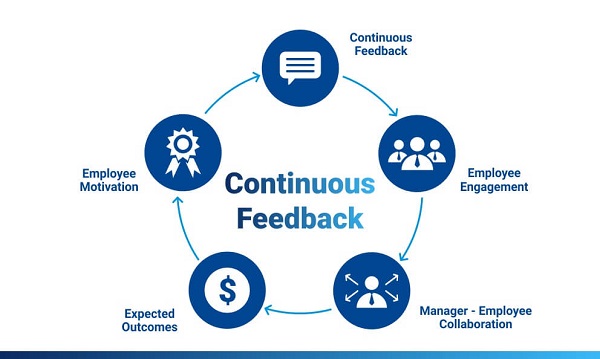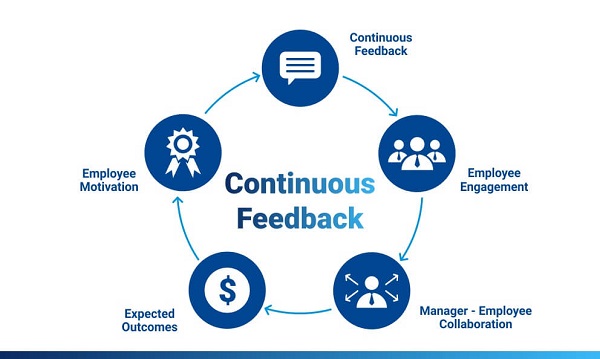In any workplace, feedback is critical. Although we typically think of managers providing feedback to their employees, employee feedback to managers is just as valuable. Feedback helps both managers and employees to identify areas for improvement and achieve their best possible performance.
There are good and bad ways to provide feedback for managers and employees. In this article, we’ll focus on employee feedback to managers. We’ll also consider why it matters and how managers can accept it constructively.
Importance of Taking Employee Feedback
Employees want companies to listen to their concerns. When employees feel that their manager is listening to them, their level of engagement increases. High levels of employee engagement offer all sorts of benefits to the company. Here are some obvious benefits:
- Higher employee satisfaction: When employees are highly engaged in the workplace, they know their opinions are valued and satisfied. Job satisfaction leads to greater productivity.
- Higher retention and lower turnover: Employees who feel appreciated are less likely to leave a company.
- Lower rates of employee absenteeism: A Gallup poll found that highly engaged workplaces experienced a 41% reduction in absenteeism.
- Increased profits: According to Smarp, companies with a highly-engaged workforce are 21% more profitable on average.
Just like everyone else, managers make mistakes. Employee feedback to the manager allows leaders to assess their performance objectively and make adjustments. Employee feedback can also improve other elements of a business. For example, employee feedback can improve business processes, reduce costs, improve productivity, and more.
What is The Role of a Manager In a Feedback Process?
The role of a manager in a feedback cycle is that of a mediator or go-between. A line manager can mediate between employees, senior management, and key decision-makers. Managers will have to manage all types of feedback, from personal issues between staff, requests for time off, and more. These issues are managed in a continuous feedback loop.

Source: Question Pro
On occasion, an employee might need to give feedback that directly relates to the manager’s performance. That feedback might be provided through another channel, for example, the Human Resource Department, or directly. In this instance, the manager should be receptive and welcome the opportunity to improve. They should resist the temptation to “pull rank” or become defensive.
Managers should not hold it against employees when they speak up about a problem. If your employees feel comfortable enough to raise an issue, it’s a sign of a positive team culture.
A major part of the manager’s role is to give feedback to employees informally or as part of formal performance evaluations. As a manager, you should always be encouraging and supportive. If there is a problem, try to identify the source by asking open-ended questions. Only after identifying the source of the problem should you share your critical feedback.
What Is the Role of an Employee In the Feedback Process?
Though it can be challenging, you should strive to be direct when providing feedback to a manager. However, you must remember to be constructive. The idea is not to complain, let off steam, or pick a fight. Instead, the point is to provide constructive feedback.
Employees giving feedback must do so as respectfully as possible and at the right time. For example, you probably shouldn’t start giving feedback when your manager is engrossed in a task or on a deadline.
Here’s a tip I often use: if you want to give feedback, but it’s not quite the right time, write everything down. I usually make some notes, organize my thoughts, and then arrange a meeting.
In general, you should give feedback in private. This means either a personal email, phone call, or one-to-one meeting. Employees should also choose their words carefully and be solution-oriented. In other words, don’t just talk about what’s wrong; offer solutions.

Source: PBEA
Of course, you should also be receptive when receiving feedback from your manager. It can be tempting to come up with excuses whenever a manager points out an area for improvement. Instead, owning your mistakes and taking steps to improve will reflect well on you. Performance evaluation provides you with an opportunity to do better.
Why Employees Avoid Giving Honest Feedback To Managers?
Providing critical feedback to your manager can be difficult. As most employees will tell you, the problem is, it’s difficult to give honest feedback to your boss. There is a simple reason for this: employees fear reprisal.
It’s natural to fear your superior will retaliate against you if you provide critical feedback. That’s the case in any situation; it’s made worse at work because of the power dynamics. Unfortunately, some managers do respond negatively to any critical feedback.
Many people feel that any feedback they give will be ignored. After all, if a manager gives negative feedback to an employee, they must act on it or face disciplinary action. The reverse is not true.
What Can Managers Do To Get Feedback From Employees?
For an effective feedback management cycle to work, managers must help employees overcome their fear to provide honest feedback. Of course, this cannot be achieved in one day.
Managers must work continually to build a culture of giving and receiving feedback. That means they should encourage input from employees from their first day of work in the office. Managers can also implement programs to demonstrate that everyone’s opinions matter in the workplace.
For example, managers can schedule regular one-to-one feedback sessions where employees are encouraged to share any issues. Managers should then use the feedback to make positive changes in the workplace. Once managers start to do this, employees will see that it is safe, and even encouraged, to give candid feedback.
Don’t be surprised if this takes time. If you don’t already have a strong feedback culture, you’ll need one or two brave employees to speak up first. Once they do so and receive a positive reaction, others will feel empowered to do the same.
Ask The Right Questions
Even if a manager has created a positive feedback culture, some employees might still have difficulty sharing their opinions. When this occurs, managers can gently guide the employee towards opening up by providing answers to common questions or rephrasing issues through role-playing. It’s a bit like email prospecting.
Here are some questions they might wish to ask:
- How could I be providing you with more opportunities to develop your professional skills?
- If you were a manager, how might you ensure the professional development of your employees?
- Is there anything in our current workflow or processes that could be improved?
- How is your relationship with your co-workers?
- Are you generally satisfied with your work here?
- How do you see yourself in your professional life in five years?
- What company policies do you think could be improved?
When asking for feedback, avoid questions that solicit a “yes/no” answer wherever possible.
You should also take into account how your employees prefer to communicate. Some people are less comfortable with face to face meetings. In these cases, managers can send them questions and allow them to send a response. Having time to think through answers can make employees feel less “put on the spot.”
Managers should also reassure employees that feedback will be kept confidential, that there is no right or wrong answer, and that employees will not be penalized for speaking candidly.
Bottomline
Good managers encourage feedback in the workplace. They also understand that communication should be a two-way street. In other words, managers should not be the only ones giving feedback. They must also be able to receive it graciously and implement it to improve their performance. For good managers, all opinions matter in the workplace.
However, managers should also recognize that not all employees feel comfortable with the idea of sharing their opinions with their superiors. This is why managers and leaders must build a culture of feedback from day one. By allowing employees to voice their honest opinions without fear of reprisal, managers can improve their role. With a positive process that allows both employees and managers to give and receive candid feedback, everyone will benefit.
Looking For HR Management System?
Call Pursho @ 0731-6725516
Telegram Group One Must Follow :
For Startups: https://t.me/daily_business_reads







